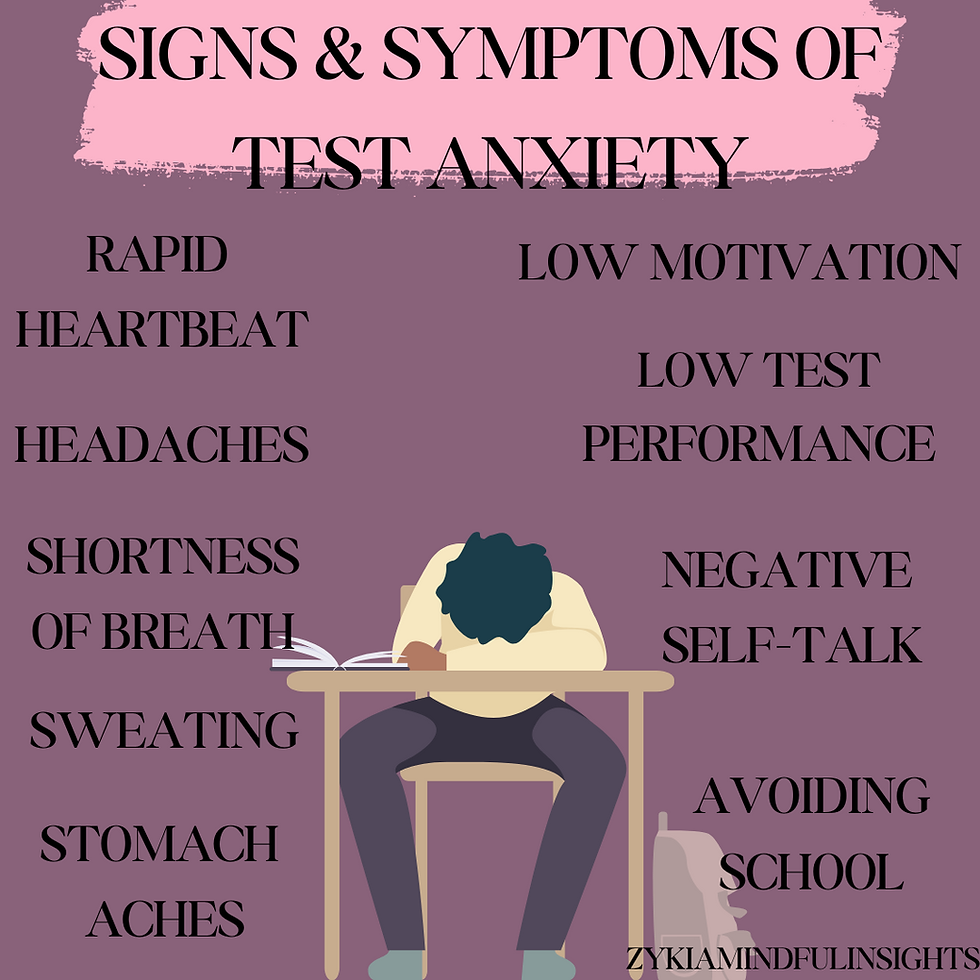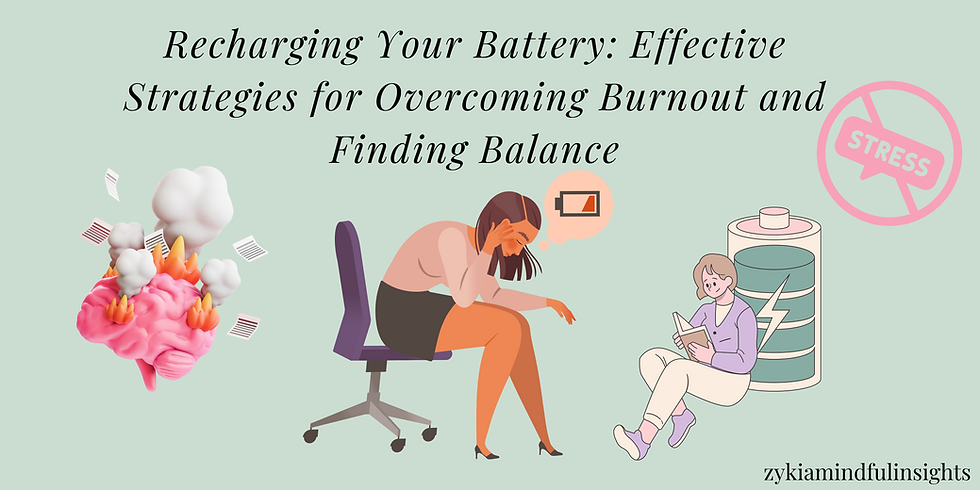Coping with Test Anxiety: Can it be Treated?
- Zykia Hannah

- Feb 16, 2024
- 5 min read
Coping with test anxiety involves various strategies such as deep breathing exercises, positive self-talk, adequate preparation, time management, and seeking support from family, friends, or professional if needed. It's also important to maintain a healthy lifestyle with regular exercise, proper nutrition, and sufficient sleep to manage stress levels effectively.

Coping with test anxiety involves adopting various strategies to manage stress and improve performance. Here are some techniques:
Preparation: One of the most effective ways to combat test anxiety is through preparation. Creating a study schedule, breaking down the material into manageable chunks, and reviewing regularly can help build confidence and reduce anxiety.
Deep Breathing: Practice deep breathing exercises to calm your nerves. Deep, slow breaths can help reduce feelings of anxiety and increase relaxation. Try techniques like diaphragmatic breathing or square breathing.
Positive Self-Talk: Replace negative thoughts with positive affirmations. Instead of focusing on what could go wrong, remind yourself of your abilities and past success, Encourage yourself with statements like "I am prepared and capable" or "I can handle this."
Visualization: Visualize yourself succeeding in the test. Imagine yourself feeling confident, focused, and preforming well. Visualization can help reduce anxietty and increase self-confidence.
Mindfulness and Relaxation Techniques: Practice mindfulness techniques such as meditation or progressive muscle relaxation to calm your mind and body. These techniques can help you stay present-focused and reduce anxious thoughts.
Healthy Lifestyle: Prioritize self-care by maintaining a healthy lifestyle. Get regular exercise, eat balanced meals, and prioritize sleep. Taking care of your physical health can positively impact your mental well-being and ability to cope with stress.
Time management: Develop effective time management skills to avoid last-minute cramming and reduce stress. Break down your study sessions into manageable time blocks and allocate enough time for review and relaxation.
Seek Support: Don't hesitate to seek support from friends, family, teachers, or mental health professionals if you're struggling with test anxiety. Talking about your feelings and getting encouragement from others can provide valuable support.
Remember, it's normal to feel anxious before a test, but with practice and perseverance, you can learn to manage your anxiety and perform at your best.
Is it possible to overcome anxiety?
It is definitely possible to overcome test anxiety. While it may take time and effort, many people successfully manage and reduce their test anxiety with various coping strategies and techniques. By practicing relaxation techniques, developing positive thinking patterns, improving study habits, seeking support, and gradually exposing oneself to testing situations, individuals can significantly reduce their anxiety levels and perform better on tests. It's important to remember that overcoming test anxiety is a process, and progress may vary from person to person. With persistence and the right support, it is absolutely achievable to overcome test anxiety.
"Believe yourself and all that you are. Know that there is something inside you that is greater than any test or challenge."
Understanding Test Anxiety:
Test anxiety is a common experience characterized by feelings of nervousness, fear, and apprehension before or during exams. It can manifest in physical symptoms such as sweating, rapid heartbeat, and difficulty concentrating. Understanding that test anxiety is a natural response to stress and performance pressure is the first step in coping with effectively. Recognizing the signs and symptoms of test anxiety can help individuals develop strategies to manage and overcome it.
Preparation and Planning:
Effective preparation is key to reducing test anxiety. Developing a study plan that breaks down the material into manageable sections and setting realistic goals can help alleviate feelings of overwhelm. Start studying well in advance to avoid last-minute cramming, which can increase stress levels. Use active study techniques such as flashcards, practice quizzes, and summarizing information to engage with the material effectively. By being well-prepared, individuals can feel more confident and in control of their performance.
Mindfulness and Relaxation Techniques:
Incorporating mindfulness and relaxation techniques into your tesst preparation routine can help calm your mind and reduce anxiety levels. Practice deep breathing exercises, progressive muscle tensions, or mindfulness mediation to center yourself and alleviate stress. Engaging in these practices regularly can help build resilience against test anxiety and promote a sense of inner calmness. By staying present-focused and grounded, individuals can approach exams with a clearer mind and greater confidence.
Positive Self-Talk and Reframing:
Positive self-talk involves replacing negative thoughts and self-doubt with encouraging and affirming statement. Instead of focusing on potential failure or worst-case scenarios, remind yourself of your abilities, past successes, and preparation efforts. Reframe challenging situations as opportunities for growth and learning rather than threats to your self-worth. Cultivating a positive mindset can boost self-confidence and resilience in the face of test anxiety.
Seeking Support and Resources:
Don't hesitate to seek support from friends, family, teachers, or mental health professionals if you're struggling with test anxiety. Talking about your feelings and experiences can provide validation and perspective. Additionally, many resources are available to help individuals cope with test anxiety, including online articles, books, workshops, and counseling services. By reaching out for support and utilizing available resources, individuals can develop personalized strategies to manage and overcome test anxiety effectively.

In this section we will be talking about the Impact on Performance: Explore the between test anxiety and academic performance.
Test anxiety can have a significant impact on academic performance, affecting various aspects of cognitive function and test-taking abilities. When individuals experience high levels of anxiety before or during exams, it can impair their ability to concentrate, process information, and recall knowledge effectively. This can lead to decreased performance on tests and assessments.
One of the primary ways to test anxiety impacts performance is by interfering with cognitive function. Anxiety triggers the body's stress response, flooding the brain with hormones such as cortisol and adrenaline. These hormones can disrupt neural pathways involved in higher-order thinking, problem-solving, and decision-making, making it harder for individuals to think clearly and critically analyze test questions.
Furthermore, test anxiety can impair memory recall, making it difficult for individuals to retrieve information they have previously learned. Anxiety can interfere with the encoding and retrieval processes in the brain, leading to lapses in memory and difficulty recalling key concepts or facts during the test. This can result in incomplete or inaccurate responses to test questions, ultimately impacting overall test performance.
In addition to cognitive effects, test anxiety can also manifest physically, with symptoms such as sweating, trembling, rapid heartbeat, and gastrointestinal discomfort. These physical symptoms can further distract individuals during exams, disrupting their focus and exacerbating feelings of anxiety and stress.
Overall, high levels of test anxiety can significantly impair academic performance by interfering with cognitive function, memory recall, and overall test-taking abilities. Recognizing the impact of test anxiety is the first step in developing strategies to manage and mitigate its effects, ultimately enabling individuals to perform to the best of their abilities settings.

"Tests are not a measure of your worth or intelligence. They are simply a way to showcase your knowledge. Stay calm, stay focused, and trust in your abilities."

In conclusion, coping with test anxiety is a journey that requires patience, practice, and perseverance. By implementing various strategies such as preparation and planning, mindfulness and relaxation techniques, positive self-talk, and seeking support, individuals can effectively manage their anxiety and improve their performance on exams. It's important to remember that test anxiety is a common experience, and it's okay to seek help when needed. With dedication and the right support system, it is possible to overcome test anxiety and approach exams with confidence and resilience, ultimately achieving success in academic endeavors.
🤍Quote of the day:
"Success is not final, failure is not fatal: It is the courage to continue that counts."🩷




Comments